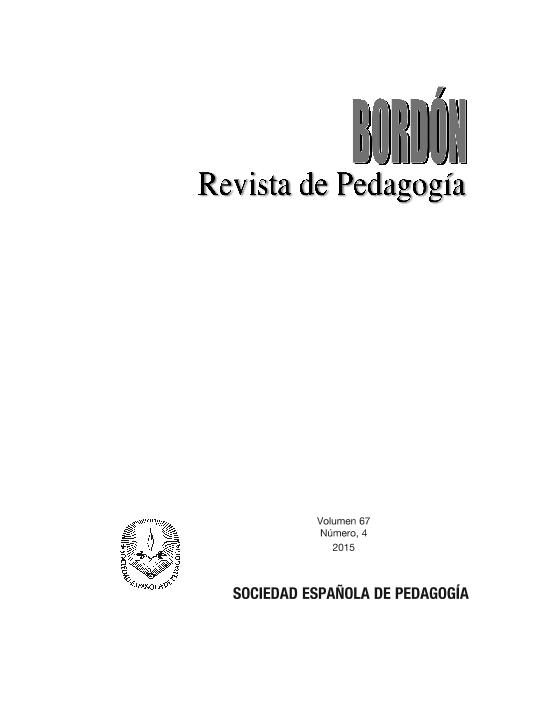Mostrar el registro sencillo del ítem
dc.contributor.author
Zalazar Jaime, Mauricio Federico

dc.contributor.author
Cupani, Marcos

dc.contributor.author
de Mier, Mariela Vanesa

dc.date.available
2019-02-08T15:16:48Z
dc.date.issued
2015-10
dc.identifier.citation
Zalazar Jaime, Mauricio Federico; Cupani, Marcos; de Mier, Mariela Vanesa; Evaluation of the performance model of social cognitive theory of career: Contributions of differential learning experiences; Sociedad Espanola de Pedagogia; Bordon; 67; 4; 10-2015; 153-169
dc.identifier.issn
2340-6577
dc.identifier.uri
http://hdl.handle.net/11336/69750
dc.description.abstract
Introduction. The aim of this study was to evaluate the structure of the self-efficacy sources scale in Mathematics (Usher & Pajares, 2009) and the academic performance model proposed by the Social Cognitive Career Theory (Lent, Brown & Hackett, 1994), considering the self-efficacy sources, self-efficacy beliefs, outcome expectations, and goals. Method. We evaluated 574 Argentinean teenagers (between 12 and 16 years of age, M = 13.73). Results. Confirmatory factor analysis showed that the model fitted the data well. Regarding internal consistency, the four self-efficacy sources reported adequate values (>.70). Nevertheless, vicarious experience presented low reliability. Structural equation modeling also indicated that Social Cognitive Career Theory performance model fits adequately to the local population in our study. The contribution of self-efficacy sources to self-efficacy beliefs was consistent with other research. In the case of outcome expectations, there was only a significant contribution from vicarious learning and physiological and emotional states. Discussion. We discuss these results and analize the limitations in order to propose further studies.
dc.format
application/pdf
dc.language.iso
eng
dc.publisher
Sociedad Espanola de Pedagogia
dc.rights
info:eu-repo/semantics/openAccess
dc.rights.uri
https://creativecommons.org/licenses/by-nc-sa/2.5/ar/
dc.subject
Academic Performance
dc.subject
Argentinean Teenagers
dc.subject
Mathematics
dc.subject
Self-Efficacy
dc.subject
Self-Efficacy Sources
dc.subject
Social Cognitive Career Theory
dc.subject
Social Cognitive Theory
dc.subject.classification
Psicología

dc.subject.classification
Psicología

dc.subject.classification
CIENCIAS SOCIALES

dc.title
Evaluation of the performance model of social cognitive theory of career: Contributions of differential learning experiences
dc.type
info:eu-repo/semantics/article
dc.type
info:ar-repo/semantics/artículo
dc.type
info:eu-repo/semantics/publishedVersion
dc.date.updated
2019-02-07T14:51:39Z
dc.identifier.eissn
0210-5934
dc.journal.volume
67
dc.journal.number
4
dc.journal.pagination
153-169
dc.journal.pais
España

dc.description.fil
Fil: Zalazar Jaime, Mauricio Federico. Consejo Nacional de Investigaciones Científicas y Técnicas. Centro Científico Tecnológico Conicet - Córdoba. Centro de Investigaciones y Estudio sobre Cultura y Sociedad. Centro de Investigaciones de la Facultad de Psicología - Grupo Vinculado CIPSI; Argentina
dc.description.fil
Fil: Cupani, Marcos. Consejo Nacional de Investigaciones Científicas y Técnicas. Centro Científico Tecnológico Conicet - Córdoba. Centro de Investigaciones y Estudio sobre Cultura y Sociedad. Centro de Investigaciones de la Facultad de Psicología - Grupo Vinculado CIPSI; Argentina
dc.description.fil
Fil: de Mier, Mariela Vanesa. Consejo Nacional de Investigaciones Científicas y Técnicas. Oficina de Coordinación Administrativa Saavedra 15. Centro Interdisciplinario de Investigaciones en Psicología Matemática y Experimental Dr. Horacio J. A. Rimoldi; Argentina
dc.journal.title
Bordon
dc.relation.alternativeid
info:eu-repo/semantics/altIdentifier/url/https://recyt.fecyt.es/index.php/BORDON/article/view/Bordon.2015.67410
dc.relation.alternativeid
info:eu-repo/semantics/altIdentifier/doi/https://doi.org/10.13042/Bordon.2015.67410
Archivos asociados
